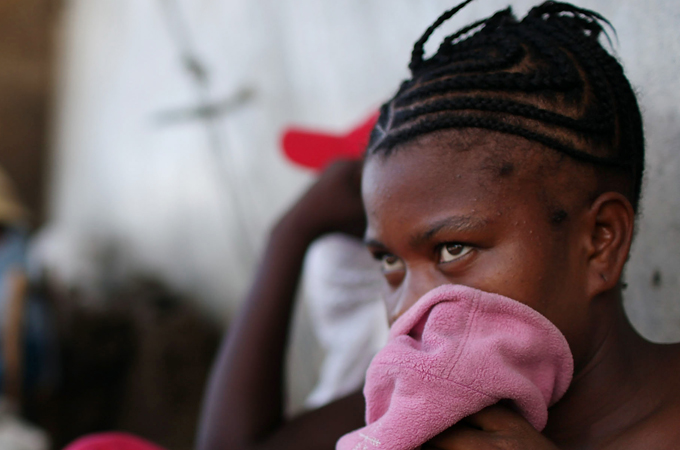UN appeals for Haiti cholera aid
World body in plea for $164m as epidemic kills 796 and infects more than 12,000 people since last month.

| Al Jazeera’s Cath Turner reports on how Haitians are increasingly concerned at the lack of help in dealing with cholera |
The United Nations has launched an appeal for $164m to tackle the growing cholera outbreak, and stop the country being “overrun” by the epidemic.
“We hope we can get this otherwise all our efforts will be overrun by the epidemic,” Elisabeth Byrs, a spokeswoman for the UN Office for the Co-ordination of Humanitarian Affairs (OCHA), said on Friday.
Keep reading
list of 4 items‘Mama we’re dying’: Only able to hear her kids in Gaza in their final days
Europe pledges to boost aid to Sudan on unwelcome war anniversary
Birth, death, escape: Three women’s struggle through Sudan’s war
Byrs said the UN, other aid agencies and Haiti’s health ministry needed $163.8m for a strategy to stifle the sudden epidemic, which has killed 796 and infected more than 12,000 people since last month.
Cholera has been found in six of the country’s 10 provinces, Byrs said.
There have been roughly 1,000 new cases each day this week, following a storm that hit the country, and the death toll has been rising steadily with 60 new fatalities recorded on Wednesday and more than 80 on Thursday.
The strategy drawn up by the UN “anticipates up to 200,000 people to show symptoms of cholera ranging from cases of mild diarrhoea to the most severe dehydration” over a period of about six months, OCHA and the World Health Organisation (WHO) said.
The two bodies were unable to say how many people had so far experienced such broad symptoms in the country where a major earthquake on January 12 killed more than 250,000 people and destroyed homes, forcing survivors to live in cramped makeshift camps.
Supplies urgently needed
“We urgently need medical staff, trained nurses … and to ramp up medical supplies,” Byrs said.
OCHA warned that the sheer quantity of relief items that need to be delivered over the coming weeks meant that more financial and logistical support was needed.
The WHO said the death rate had been “relatively stable” in the outbreak although at high levels, mainly down to the vulnerability of Haitians to the bacterial infection, which is carried by contaminated water.
Christian Lindmeier, a WHO spokesman, told Al Jazeera that they are expecting about 20,000 cholera patients in the next 6-12 months.
“We need the materials to be ready to treat up to 200,000 people in the next six months,” he said.
“At the moment we are trying to break the cycle of contamination. The water, rivers and lakes are contagious. We are trying to sensitise residents about washing themselves properly before they eat … disinfect the water before they drink it or cook.
“The next step is to set up treatment centres. We have many set up already with seven alone in the capital. Right now we are dealing with about 1,500 bed capacity, we want to beef it up to 2000 in the next weeks.”
Money injection
Cath Turner, Al Jazeera’s correspondent in the capital Port-au-Prince, said that Haitians are in need of an immediate injection of money.
 |
| Fears are growing of a major cholera outbreak in country’s quake-ravaged capital Port-au-Prince [AFP] |
“We’ve just come from a ward run by Doctor Without Borders in Cite Soleil, the largest slum in Port-au-Prince, and the staff say they are going to have to start treating people in the street,” she said.
“They say the number of people coming into the clinic doubles every day. However, there is the chance of donor fatigue [from the international community].
“It’s been a year full of disasters all over the world.”
The toll soared again on Friday and 13 more deaths in the capital raised fears the epidemic could spread in camps full of earthquake survivors.
“We greatly fear a flare-up in the capital which would be serious given the conditions in the camps,” Claude Surena, president of the Haitian Medical Association, told the AFP news agency.
Haitian authorities have been warned to expect a different scale of disaster if cholera takes hold in Port-au-Prince, much of which was flattened by the earthquake.
Growing anger
An estimated 1.3 million Haitians live in refugee camps, most in tent cities around the capital where water-borne cholera could spread easily in filthy conditions where scarce supplies are shared for cooking and washing.
Residents of Cite Soleil have been demonstrating over the country’s response to the cholera outbreak.
The protesters said the government and the UN have failed to protect them, as the number of people killed by the highly contagious water-borne disease continues to soar.
“They live near a rubbish dump which is normally a site for household and industrial waste, but for the last year human waste has been added to that,” our correspondent said.
“Of course, with the cholera outbreak, human faeces and water mixed together is a sure way to get the disease.
“We saw a truck that was carrying human waste to the dump, but it was forced to turn around and retreat because the people started throwing rocks at it.”